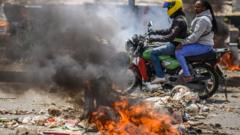Tensions are escalating in Kenya following President William Ruto's significant donation to a local church, leading to protests and clashes between demonstrators and police.
Clashes Erupt in Kenya Over President's Church Contribution

Clashes Erupt in Kenya Over President's Church Contribution
Protests intensify as Kenyans react to President Ruto's church donation amidst economic struggles.
Police in Kenya have deployed tear gas to disperse crowds attempting to occupy the Jesus Winner Ministry in Roysambu, Nairobi, after President William Ruto donated 20 million shillings (approximately $155,000) to the church. This financial support has angered many young people grappling with the soaring costs of living, leading to protests characterized by blocked roads and clashes with authorities.
Ruto has defended his donation, expressing that it reflects a commitment to addressing moral issues within the nation, and he has announced similar support for another church in Eldoret. Despite this, the donation comes in the wake of previous rejections by senior religious leaders, including those of Kenya’s Catholic and Anglican churches, who have expressed concerns over the church's potential use for political leverage.
Protesters attempted to access the church, creating chaos by lighting fires and barricading nearby streets, while several arrests were made during the unrest. Despite the disturbances, church services continued under heavy security. Local Bishop Edward Mwai accused unidentified individuals of coordinating efforts to instigate violence and disrupt the service.
As Kenya grapples with economic challenges, including tax hikes introduced since Ruto’s election in 2022, public anger is mounting against the administration. Many citizens are calling out Ruto for the rising cost of living, demanding that efforts be directed towards reducing waste and corruption in public spending.
Last year, widespread protests resulted in Ruto withdrawing a controversial Finance Bill that proposed additional tax increases, reflecting ongoing tensions between government policies and public sentiment.




















